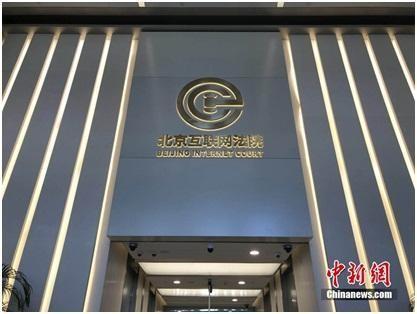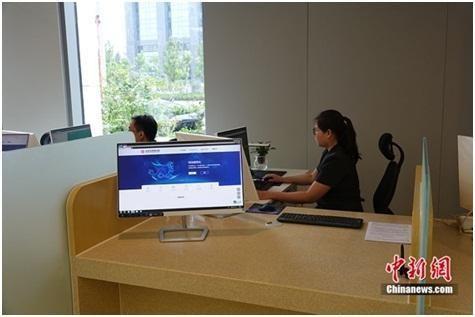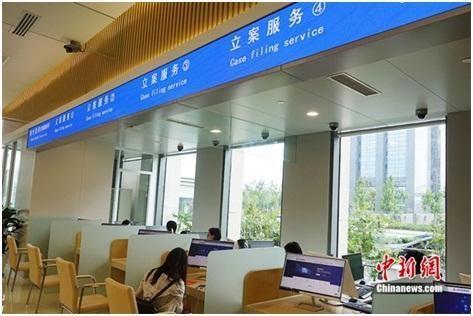Chinanews. com client September 10 (Reporter Fu Qiang) The Beijing Internet Court was deeply concerned as soon as it was established. As of 18: 00 on the 10th, the electronic litigation platform of our hospital had received 207 applications for online filing, and the dispute over the right to spread information on the network of "vibrato short video" v. "co-shooting small video" became the first case accepted.

Beijing Internet Court. Photo by leng Yuyang
"Online Litigation" has been recognized and more than 200 cases have been accepted.
According to the Beijing Internet Court, since its electronic litigation platform was opened to the public on the 9th, as of 18: 00 on the 10th, the total number of visits has reached 207,300, with 586 registered users, and 207 online filing applications have been received.
It is also known that the technical service hotlines of Beijing Internet Court (86433901, 86433902) have answered the hotlines 78 times so as to solve problems existing in practical operations such as electronic litigation platform and WeChat applet. The filing service hotline (86433721) answered the hotline 77 times, answering questions from the parties about the jurisdiction of the court and the scope of accepting cases.
According to the court, some parties have specially called to praise the way of internet litigation, saying that the electronic litigation platform has provided great convenience and saved a lot of time and energy for the parties.

Interior of Beijing Internet Court. Fu Qiang photo
"Tik Tok" v. "Gang Pai" became the first case accepted.
It is reported that the dispute over the information network communication right of "short video with vibrato" v. "small video with partners" became the first case accepted by Beijing Internet Court.
According to the contents disclosed by Beijing Internet Court, the plaintiff Beijing Weibo Vision Technology Co., Ltd. claimed that "Vibrato Short Video" is an original short video sharing platform legally owned and operated by it. For the short video created by the creator who signed an exclusive agreement, the plaintiff obtained the exclusive right to spread the information network and the exclusive right to defend rights. The "5.12, I want to tell you" short video released on the platform of "Vibrato Short Video" (hereinafter referred to as the short video involved in the case) was independently created by the creator of the short video involved in the case, and should be protected by China’s copyright law as a work.
Defendant Baidu Online Network Technology (Beijing) Co., Ltd. and Defendant No.2 Beijing Baidu Netcom Technology Co., Ltd. jointly provided users with the download, installation, operation and update and maintenance of related functions, and publicized and promoted the "small video". The plaintiff found that after the short video involved in the case was released on the Tik Tok platform, the two defendants spread the short video involved in the case and provided download service without the plaintiff’s permission.
The plaintiff believed that the two defendants’ unauthorized dissemination caused great economic losses to the plaintiff, so they filed a lawsuit according to law, demanding that the two defendants stop the infringement, compensate the plaintiff for the economic loss of 1 million yuan, and reasonably pay 50 thousand yuan for the lawsuit.
It is understood that the case is the litigation materials and filing application submitted by the plaintiff online on the electronic litigation platform of Beijing Internet Court. After the online review by the judge of the filing court of Beijing Internet Court, the case has been formally accepted. The parties can grasp the progress of the case in real time through their registered accounts.
According to the Beijing Internet Court, at present, the legal protection of the short video industry at home and abroad is in the exploratory period. This case is the first lawsuit on short video copyright between the two platforms. Whether the short video involved constitutes a work, the rights boundary between short video platforms, between short video platforms and users, and the application of blockchain forensics technology in the judiciary are worthy of attention.

Beijing Internet Court. Photo by leng Yuyang
On-line trial of online cases Internet courts highlight serving the convenience of the people.
It is understood that the newly established Beijing Internet Court has centralized jurisdiction over first-instance specific Internet cases that should be accepted by grassroots people’s courts in Beijing, including Internet shopping and service contract disputes; Internet financial loans, small loan contract disputes, Internet copyright ownership and infringement disputes; Internet domain name disputes; Internet tort liability disputes; Internet shopping product liability disputes; Internet-related public interest litigation cases filed by procuratorial organs; Administrative disputes caused by the administrative management of the Internet; Other Internet civil and administrative cases designated by the people’s court at a higher level.
In terms of trial methods, Beijing Internet Court takes "online trial of online cases" as the principle, focusing on building an electronic litigation platform. Without going to the court, the parties can realize the online handling of all or part of litigation links such as prosecution, mediation, filing, service, mediation, trial, judgment and execution.
According to the application of the parties or the needs of case trial, the Internet court may also decide to complete some litigation links offline.
A case concluded by Beijing Internet Court in the first instance may appeal to Beijing No.4 Intermediate People’s Court if the party refuses to accept the judgment or ruling. However, appeal cases involving Internet copyright ownership disputes, infringement disputes and Internet domain name disputes are tried by Beijing Intellectual Property Court.
Some commentators believe that through the network handling from filing a case to executing all or part of the litigation, the parties can "run less" or even "not run", highlighting the concept of serving the convenience of the people, and at the same time significantly reducing the litigation costs of the parties. (End)